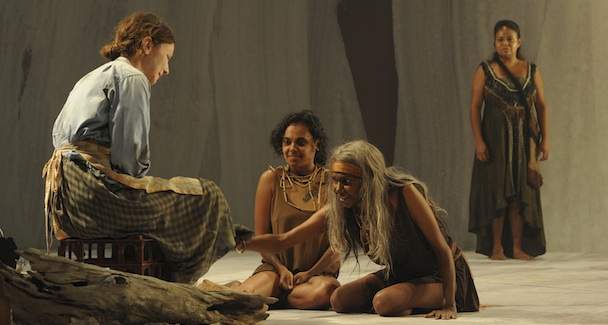The Secret River – Sydney Theatre Company
Neil Armfield directs Kate Grenville's acclaimed novel, creating a surely iconic work of Australian theatre.
Overview
Kate Grenville's 2005 novel, The Secret River, is the arresting story of William Thornhill, an English convict sent to Australia for the term of his natural life in 1806. The life he makes for himself and his family on the Hawkesbury River after his subsequent pardon is an example of clumsy and ultimately brutal 'settling' of Aboriginal land. Andrew Bovell's adaptation for the stage matches Grenville's novel with full force, and Neil Armfield's direction delivers a powerful blow to the gut.
The story has been given its proper weight and significance in all elements of the production. Set designer Stephen Curtis has transformed the main stage at Sydney Theatre Company into a bush setting a majestic, dusty-white swathe of canvas tumbles from the ceiling, evoking paperbarks or cliff faces. Eucalyptus foliage frames the space and a live fire crackles away throughout.
Iain Grandage's music is a faithful support to the narrative such that it's an emotionally charged production. Music that follows storyline like a film score in theatre can be emotionally manipulative, but in this case the music is owned by all members of the cast, with Trevor Jamieson regularly picking up the guitar to accompany Grandage on the piano and others assisting with percussion. Grandage's arrangement of an English folk song overlapping a traditional Aboriginal tune, sung by the entire cast, is superb.
The importance of this story cannot be overemphasised. On the one hand, it is a historical account of a tragic event, but on the other it's a crucial conversation with a persistently painful present. Armfield quotes actor Ursula Yovich in his programme notes from her letter to him about the generational damage caused by events such as the murders in this story: “The trauma is so deep that we believe in our own worthlessness." This large cast brings the tragedy to the stage with humanity and extraordinary courage.
Jeremy Sims's characterisation of the vile Smasher Sullivan is brave for its extreme ugliness. Similarly, Daniel Henshall playing convict Dan and Matthew Sunderland as Sagitty both portray a confronting level of unthinking callousness. In contrast to this trio is the young Thornhill family, who for the most part try to live by some sort of morals. Thornhill’s characterisation by Nathaniel Dean is one of a decent man who can't quite command his own mind. Anita Hegh as his wife, Sal, is rough and warm, a smart woman counting down the days till her return to England. Their initially cordial but confused relationship with "those that are there" in the end gives way to violence.
Roy Gordon as the elder, Yalamundi, is a dignified, gentle presence, as is Ethel-Anne Gundy playing Buryia. Last seen in The Sapphires, Miranda Tapsell is a versatile and captivating performer. Bruce Spence as a kangaroo is magnificent.
The couple embodying reason and sense in this story are Thomas Blackwood (Colin Moody) and Dulla Djin (Ursula Yovich). Blackwood's advice is always, "give a little; take a little." In a potent moment, Yovich playing Dulla Djin responds to Thornhill's offer of a gift by saying calmly, "you could leave our place, William Thornhill." Yovich also performs as Dhirrumbin, the narrator. She is a gentle and steadfast witness, observing scenes at a knowing distance.
STC has put a lot into this production, and it shows. Each aspect is carefully executed to form a moving whole. On opening night it fittingly received a standing ovation. This is the sort of epic theatre that can shape national identity.
Photo by Heidrun Lohr.





